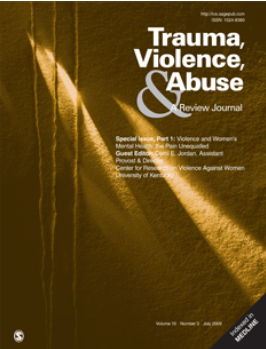Strengths-Based Programs for Youth at Risk for Toxic Stress: A Scoping Review of Programs Targeting Mental Health, Substance Use, Parenting Skills, and Family Functioning
IF 5.4
1区 社会学
Q1 CRIMINOLOGY & PENOLOGY
引用次数: 0
Abstract
This scoping review explores and describes recent strengths-based programs for use among youth (ages 12–24) at risk for toxic stress that target mental health (MH) or substance use (SU) outcomes through improving family functioning (FF) and/or parenting skills (PS). Following Preferred Reporting Items for Systematic Reviews and Meta-Analyses Extension for Scoping Reviews guidelines, seven databases were searched for peer-reviewed articles published between 2018 and 2023. Inclusion criteria included articles describing programs delivered to both youth and caregivers that targeted MH or SU outcomes through improving FF and/or PS. Thirty-three articles describing 33 programs were identified, 25 of which were research studies. Programs predominantly employed behavioral frameworks with varied duration and caregiver involvement. Most targeted MH outcomes, with fewer addressing SU. Positive outcomes included reductions in youth depression and anxiety, and improvements in emotional regulation and FF. Gaps identified included a majority of studies conducted in high-income countries, a prevalence of non-experimental designs, and a lack of standardized outcome measures. Results highlight the potential of family-centered, relational health-based interventions in promoting youth resilience and identify a need for more rigorous evaluations, culturally-responsive interventions, and increased research in low- and middle-income countries. This review underscores the promise of these interventions while revealing significant areas for future research to enhance effectiveness and applicability among adversity-impacted youth.针对有毒性压力风险的青少年的基于优势的方案:针对心理健康、物质使用、养育技能和家庭功能的方案的范围审查
本综述探讨并描述了最近在青少年(12-24岁)中使用的基于优势的计划,这些计划旨在通过改善家庭功能(FF)和/或育儿技能(PS)来实现心理健康(MH)或物质使用(SU)的结果。根据系统评价的首选报告项目和范围评价的元分析扩展指南,在7个数据库中搜索2018年至2023年间发表的同行评议文章。纳入标准包括描述通过改善FF和/或PS针对MH或SU结果的青少年和照顾者的项目的文章。确定了33篇描述33个项目的文章,其中25个是研究。项目主要采用不同持续时间和照顾者参与的行为框架。大多数有针对性的MH结果,较少解决SU。积极的结果包括减少青少年抑郁和焦虑,改善情绪调节和FF。确定的差距包括大多数在高收入国家进行的研究,普遍存在非实验设计,以及缺乏标准化的结果测量。结果强调了以家庭为中心、以关系健康为基础的干预措施在促进青年复原力方面的潜力,并确定了在低收入和中等收入国家进行更严格的评估、符合文化要求的干预措施和加强研究的必要性。本综述强调了这些干预措施的前景,同时揭示了未来研究的重要领域,以提高逆境影响青年的有效性和适用性。
本文章由计算机程序翻译,如有差异,请以英文原文为准。
求助全文
约1分钟内获得全文
求助全文
来源期刊

Trauma Violence & Abuse
Multiple-
CiteScore
13.60
自引率
7.80%
发文量
131
期刊介绍:
Trauma, Violence, & Abuse is devoted to organizing, synthesizing, and expanding knowledge on all force of trauma, abuse, and violence. This peer-reviewed journal is practitioner oriented and will publish only reviews of research, conceptual or theoretical articles, and law review articles. Trauma, Violence, & Abuse is dedicated to professionals and advanced students in clinical training who work with any form of trauma, abuse, and violence. It is intended to compile knowledge that clearly affects practice, policy, and research.
 求助内容:
求助内容: 应助结果提醒方式:
应助结果提醒方式:


